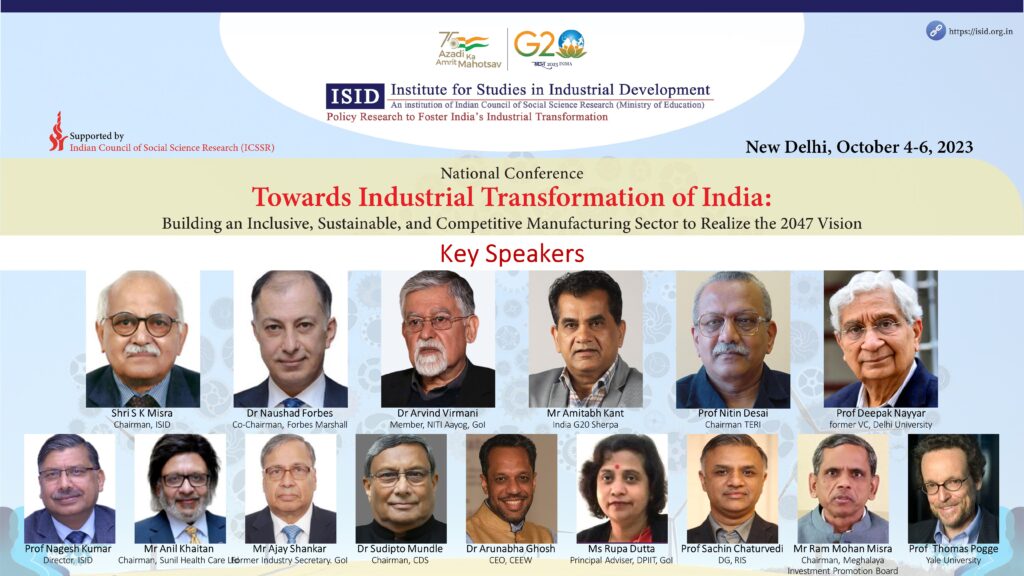 |
| ISID organized a National Conference on Industrial Transformation of India: Building an Inclusive, Sustainable, and Competitive Manufacturing Sector to Realise the 2047 Vision on October 4-6, 2023. The Conference, supported by the Indian Council of Social Science Research (ICSSR), covered six broad themes namely, Industrial Strategy for Realising Vision 2047; Sustainability and Green Industrialisation; Innovative Activity and Leveraging Industry 4.0 for Competitiveness; FDI Trade and India’s Integration with GVCs; Enhancing the Role of MSMEs and Start-ups; Geography of Industrialisation and Balanced Regional Development. The Conference included six plenary sessions and 14 technical sessions.
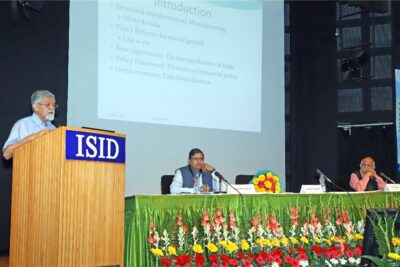 The conference began with the inaugural address by Dr Arvind Virmani, Hon’ble Member, NITI Aayog, Govt of India. The inaugural session was presided over by Shri S K Misra, Chairman, ISID and former Principal Secretary to the Prime Minister of India and moderated by Prof Nagesh Kumar, Director, ISID. Click here or the YouTube link of the Inaugural Session. The conference began with the inaugural address by Dr Arvind Virmani, Hon’ble Member, NITI Aayog, Govt of India. The inaugural session was presided over by Shri S K Misra, Chairman, ISID and former Principal Secretary to the Prime Minister of India and moderated by Prof Nagesh Kumar, Director, ISID. Click here or the YouTube link of the Inaugural Session.
Click here for the Inaugural Address by Dr Arvind Virmani
More than 200 participants including speakers, discussants and chairs participated in the Conference. The 14 technical sessions organized over three days included 70 papers presented by younger researchers had been selected out of 222 abstracts received in response to a nation-wide call issued by ISID, through two rounds of peer reviews. The technical sessions were chaired by prominent experts and also included two discussants to comment on the papers presented. The chair persons included Prof K L Krishna, Prof Pulin Nayak, Prof T C Anant, Prof Padmini Swaminathan, Prof Sachin Chaturvedi, Prof Vinish Kathuria, Prof Amit Shovan Ray, Prof Atul Sood, Prof R Nagaraj, Prof Manmohan Agarwal, Prof Lakhwinder Singh, Prof Khan Masood Ahmad, Prof Ravi Srivastava and Prof B N Goldar.
For detailed programme schedule, pls click here
Click here for downloading the abstracts of the paper presentations
The Conference also covered six plenary sessions in the form of policy roundtables with senior experts, policy makers and business leaders on the respective themes, as summarized below. |
Plenary Session I: Industrial Strategy for Realizing the Vision@2047
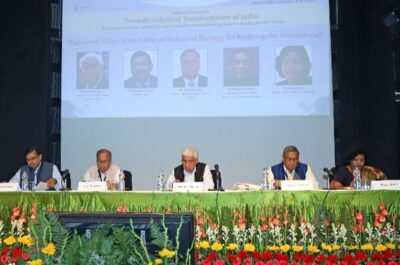 This session was chaired by Prof Deepak Nayyar, former Vice-Chancellor, University of Delhi, and Chairman of the Research Advisory Committee of ISID. The distinguished panelists in the session included Mr Ajay Shankar, Former Industry Secretary, Government of India; Dr Rupa Dutta, Senior Adviser, Department for Promotion of Industry and Internal Trade; and Dr Sudipto Mundle, Chairman, Centre for Development Studies, Trivandrum, and Member 14th Finance Commission along with a presentation made by Prof Nagesh Kumar, Director, ISID. Click here for the YouTube link of the Plenary Session I. This session was chaired by Prof Deepak Nayyar, former Vice-Chancellor, University of Delhi, and Chairman of the Research Advisory Committee of ISID. The distinguished panelists in the session included Mr Ajay Shankar, Former Industry Secretary, Government of India; Dr Rupa Dutta, Senior Adviser, Department for Promotion of Industry and Internal Trade; and Dr Sudipto Mundle, Chairman, Centre for Development Studies, Trivandrum, and Member 14th Finance Commission along with a presentation made by Prof Nagesh Kumar, Director, ISID. Click here for the YouTube link of the Plenary Session I.
|
Plenary Session II: Sustainable and Green Industrialization: Challenges and Opportunities for India
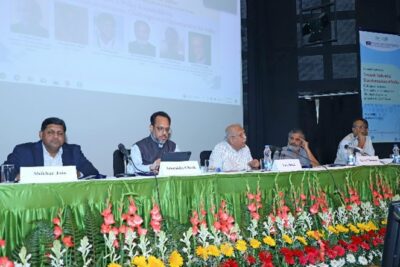 This session was chaired by Dr Nitin Desai, Chairman, TERI, and former UN Under-Secretary-General, United Nations. The panel speakers included Dr Arunabha Ghosh, CEO, CEEW; Mr Shikhar Jain, Executive Director (Sustainability), CII; Dr Laveesh Bhandari, President, CSEP (formerly Brookings India); Mr Pranav Kumar, Vice President (International Trade Policy), Reliance Industries Ltd; and Prof Thomas Pogge, Leitner Professor of Philosophy and International Affairs, Yale University, New Haven, CT, USA (online). Click here for the YouTube link of the Plenary Session II. ISID has issued a policy brief based on this discussion. This session was chaired by Dr Nitin Desai, Chairman, TERI, and former UN Under-Secretary-General, United Nations. The panel speakers included Dr Arunabha Ghosh, CEO, CEEW; Mr Shikhar Jain, Executive Director (Sustainability), CII; Dr Laveesh Bhandari, President, CSEP (formerly Brookings India); Mr Pranav Kumar, Vice President (International Trade Policy), Reliance Industries Ltd; and Prof Thomas Pogge, Leitner Professor of Philosophy and International Affairs, Yale University, New Haven, CT, USA (online). Click here for the YouTube link of the Plenary Session II. ISID has issued a policy brief based on this discussion.
|
| Plenary Session III: Leveraging Innovation and Industry 4.0 for India’s Industrial Transformation
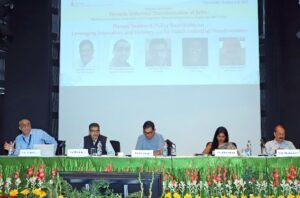 This session was chaired by Prof Rajat Kathuria, Dean, Shiv Nadar University. The eminent speakers included Mr Parminder Jeet Singh, Internet for Change, Bangalore; Prof Vinish Kathuria, IIT Bombay, and Director IDS, Jaipur; Ms Shraddha Srikant, UNIDO, India; and Prof Sujit Bhattacharya, Chief Scientist, CSIR. Click here for the YouTube link of the Plenary Session III. ISID has issued a policy brief based on this discussion. This session was chaired by Prof Rajat Kathuria, Dean, Shiv Nadar University. The eminent speakers included Mr Parminder Jeet Singh, Internet for Change, Bangalore; Prof Vinish Kathuria, IIT Bombay, and Director IDS, Jaipur; Ms Shraddha Srikant, UNIDO, India; and Prof Sujit Bhattacharya, Chief Scientist, CSIR. Click here for the YouTube link of the Plenary Session III. ISID has issued a policy brief based on this discussion.
|
| Plenary Session IV: FDI, Trade and India’s Integration with GVCs
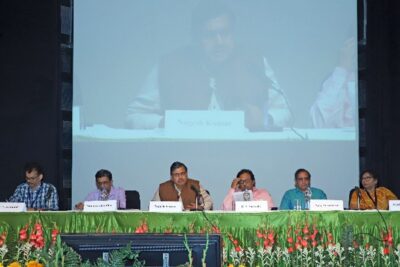 This session was chaired by Prof Nagesh Kumar, Director, ISID. The key speakers of the session were Prof C Veeramani, Director, CDS, Trivandrum; Mr Sumanta Chaudhuri, Principal Advisor, International Trade Policy, CII; Dr B N Satpathy, Office of PSA, Government of India; Mr Ajay Srivastava, Founder, Global Trade Research Initiative; and Prof Aradhna Aggarwal, Copenhagen Business School. Click here for the YouTube link of the Plenary Session IV. ISID has issued a policy brief based on this discussion. This session was chaired by Prof Nagesh Kumar, Director, ISID. The key speakers of the session were Prof C Veeramani, Director, CDS, Trivandrum; Mr Sumanta Chaudhuri, Principal Advisor, International Trade Policy, CII; Dr B N Satpathy, Office of PSA, Government of India; Mr Ajay Srivastava, Founder, Global Trade Research Initiative; and Prof Aradhna Aggarwal, Copenhagen Business School. Click here for the YouTube link of the Plenary Session IV. ISID has issued a policy brief based on this discussion.
|
| Plenary Session V: ISID Foundation Day Lecture by Dr Naushad Forbes, Co-Chairman, Forbes Marshall
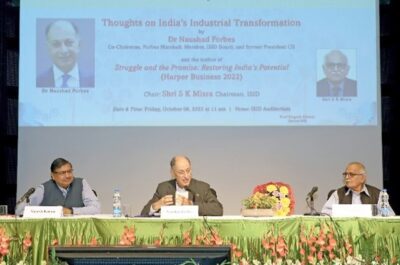 Session V was a special plenary session. ISID Foundation Day Lecture on “Thoughts on India’s Industrial Transformation” was delivered by Dr Naushad Forbes, Co-Chairman, Forbes Marshall; Member, ISID Board; and former President CII and the author of the book Struggle and the Promise: Restoring India’s Potential (Harper Business 2022). The Lecture was presided over by Shri S K Misra, Chairman, ISID and moderated by Prof Nagesh Kumar, Director, ISID. Click here for the YouTube link of the lecture. ISID has issued a policy brief based on this discussion. Session V was a special plenary session. ISID Foundation Day Lecture on “Thoughts on India’s Industrial Transformation” was delivered by Dr Naushad Forbes, Co-Chairman, Forbes Marshall; Member, ISID Board; and former President CII and the author of the book Struggle and the Promise: Restoring India’s Potential (Harper Business 2022). The Lecture was presided over by Shri S K Misra, Chairman, ISID and moderated by Prof Nagesh Kumar, Director, ISID. Click here for the YouTube link of the lecture. ISID has issued a policy brief based on this discussion.
|
| Plenary Session VI: Unlocking the Dynamism of MSMEs and Start-Ups for Industrial Transformation
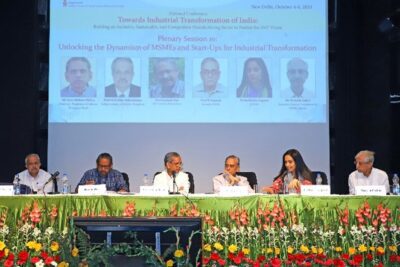 This session was chaired by Mr Ram Mohan Mishra, Chairman, Meghalaya Investment Promotion Board and formerly Development Commissioner, MSMEs, Ministry of MSMEs, Govt of India. The speakers in the session were Prof M H Bala Subrahmanya, Indian Institute of Science, Bengaluru; Prof Keshab Das, KIIT University, Bhubaneshwar; Prof R Nagaraj, formerly with IGIDR, Mumbai; Dr Radhicka Kapoor, ICRIER, New Delhi; and Mr Mukesh Gulati, Executive Director, Foundation for MSME Clusters. Click here for the YouTube link of the Plenary Session VI. ISID has issued a policy brief based on this discussion. This session was chaired by Mr Ram Mohan Mishra, Chairman, Meghalaya Investment Promotion Board and formerly Development Commissioner, MSMEs, Ministry of MSMEs, Govt of India. The speakers in the session were Prof M H Bala Subrahmanya, Indian Institute of Science, Bengaluru; Prof Keshab Das, KIIT University, Bhubaneshwar; Prof R Nagaraj, formerly with IGIDR, Mumbai; Dr Radhicka Kapoor, ICRIER, New Delhi; and Mr Mukesh Gulati, Executive Director, Foundation for MSME Clusters. Click here for the YouTube link of the Plenary Session VI. ISID has issued a policy brief based on this discussion.
|
Valedictory Session
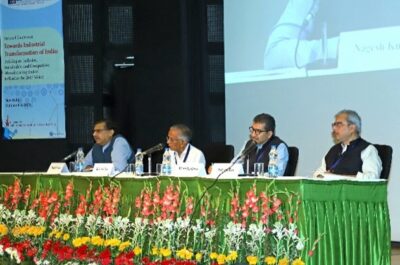 The Valedictory Session was chaired by Prof K L Krishna. Dr Satyaki Roy presented key highlights of discussions of the Conference. At the Town Hall discussion during the Valedictory Session, the participants overwhelmingly supported the idea of establishing an Industrial Development Research Association as an extended network of industrial economists in the country and beyond, anchored by ISID to regularly host such national conferences and launch a new peer-reviewed journal on industrial development to support India’s industrial transformation with evidence-based policy research, advocacy and capacity-building. The session ended with a vote of thanks presented by Dr Santosh Das and a wrap by Prof Nagesh Kumar. Click here for the YouTube link of the Valedictory Session. The Valedictory Session was chaired by Prof K L Krishna. Dr Satyaki Roy presented key highlights of discussions of the Conference. At the Town Hall discussion during the Valedictory Session, the participants overwhelmingly supported the idea of establishing an Industrial Development Research Association as an extended network of industrial economists in the country and beyond, anchored by ISID to regularly host such national conferences and launch a new peer-reviewed journal on industrial development to support India’s industrial transformation with evidence-based policy research, advocacy and capacity-building. The session ended with a vote of thanks presented by Dr Santosh Das and a wrap by Prof Nagesh Kumar. Click here for the YouTube link of the Valedictory Session.
|
|

Concept NoteThe Institute for Studies in Industrial Development (ISID), in collaboration with the Indian Council of Social Science Research (ICSSR), will organize a National Conference on India’s Industrial Transformation in commemoration of the Azadi Ka Amrit Mahotsav, a very momentous occasion celebrating 75 years of India’s Independence and to chart out its development trajectory for the coming decades.India’s ambitious vision of a developed economy with a GDP of US$ 30 trillion by 2047 cannot be realized without accelerated industrialization creating decent job opportunities for India’s youthful population and fostering inclusive and sustainable prosperity for all the citizens. Hence, the government’s initiative to boost the manufacturing sector through different strategic interventions including production-linked incentives (PLI) is timely. The industrial strategy also needs to respond to not only the changed external context for manufacturing-led growth that has turned less benign in the aftermath of the retreat of globalization and rising protectionism but also the emerging opportunities in sunrise sectors that underpin the digital revolution and sustainable industrialization.In that context, the National Conference would discuss the relevance and the opportunities for fostering manufacturing-led economic growth over the coming decades to help shape the 2047 Vision. It would also draw policy lessons from India’s own development journey of the past 75 years in the manufacturing sector as well as from experiences of successful industrializers in harnessing the potential manufacturing sector in the changed global context.Key ThemesIndustrialisation in today’s world has to be embedded into leveraging new technology, often termed as Industry 4.0 which will be disruptively altering the paradigm of production as it happened in previous industrial revolutions. It involves huge relocation of human resources from old industries to new ones particularly offering immense potential to start-ups and MSMEs as scale advantages subside due to emerging technology networks and platforms. But most importantly a vision of twenty-first century industrialisation needs to be built on the agenda of decarbonising growth through cleaner transformation of our traditional industries together with exploring possibilities of green industries and green jobs. In this larger scope of industrial transformation this conference invites research papers on the following themes:
- Industrial Strategy in the changed global context: the external context for industrialization has changed dramatically with the slowdown of the global economy, trade wars, rising protectionism, collapse of multilateral trade negotiations, and other factors leading to the retreat of globalization. India might also benefit from the trends of China+1 and friend-shoring in the supply chain diversification strategies of global corporations. What are the key opportunities and policy lessons for manufacturing-led development in India in the post-Pandemic era of a new normal of subdued growth of the world economy and trade?
- Foreign direct investment (FDI) and India’s integration with GVCs: FDI can assist the manufacturing-led growth with the asset bundles of MNCs. India’s FDI policy has been liberalized greatly over the years. However, it is not clear whether it has helped in enhancing the quality of FDI inflows, especially in terms of giving access to pioneering industries and new technologies helping in the substitution of imported goods and for integration with GVCs for export-platform production. Policy lessons to enhance quality and magnitudes of FDI inflows.
- Enhancing the role of MSMEs and Start-Ups in Industrial Transformation: MSMEs form the backbones of the Indian economy but have suffered a lot during the pandemic, with a serious liquidity crisis, and loss of demand, among other challenges. What can be done to make MSMEs more sustainable and resilient? India has emerged as the third largest Start-Ups ecosystem globally. While some Startups are highly successful trailblazers while others struggle to survive. Key lessons for success and how the ecosystem can be made more prudent and resilient?
- Geography of industrialization and balanced regional development: Industrialization could help in curbing or accentuating regional disparities depending upon the location of manufacturing. What are the policy lessons from past experiences in the geography of industry including through industrial corridors, SEZ, and other infrastructure, to foster a more balanced regional development?
- Innovative activity and Leveraging Industry 4.0 for Competitiveness: Factors and policies that may stimulate innovative activity to help build the technological capability of Indian firms would be discussed. India’s potential of leveraging the new technological revolution sometimes called the Digital Revolution or the Industrial Revolution (IR) 4.0 for manufacturing development; the potential of new industries that underpin the digital revolution including the ecosystem for the manufacture of electronics, semiconductors, and telecom equipment.
- Sustainability and Green Industrialization: In the context of India’s net zero commitments and shrinking carbon space, a transition to cleaner and greener patterns of industrialization is the need of the hour. Harnessing the potential of Green Hydrogen and Circular Economy is clearly important for a cleaner transition of traditional industries while exploiting the new green industries such as electric mobility, batteries, storage solutions, solar PV panels, and wind turbines among others. How can the Indian industry be nudged to adopt sustainability or ESG practices including through new disclosure norms?
Contributions/Papers/Presentations: The Conference would combine keynote addresses by senior experts to set the agenda, competitive presentations, and policy roundtables. ISID would issue a call for papers to attract papers from younger researchers which will be selected through a peer-review process. Policy Roundtables would involve senior researchers, policymakers, and industry experts for drawing policy lessons based on insights and analysis. ISID will compile select papers into an edited volume published by a reputed publisher. Submission dates extended:
- o Abstract (500 words): 30th June 2023
- o Date of acceptance: 10th July 2023
- o Submission of full paper due by: 20th August 2023
- o Selection of final papers: 10th September 2023
The abstracts should be submitted online using the following link
EPW Advertisement issued: Vol LVIII No 19, 13 May 2023, p. 22
For further queries and correspondence, pls email us at [email protected] |



 The conference began with the inaugural address by Dr Arvind Virmani, Hon’ble Member, NITI Aayog, Govt of India. The inaugural session was presided over by Shri S K Misra, Chairman, ISID and former Principal Secretary to the Prime Minister of India and moderated by Prof Nagesh Kumar, Director, ISID. Click
The conference began with the inaugural address by Dr Arvind Virmani, Hon’ble Member, NITI Aayog, Govt of India. The inaugural session was presided over by Shri S K Misra, Chairman, ISID and former Principal Secretary to the Prime Minister of India and moderated by Prof Nagesh Kumar, Director, ISID. Click  This session was chaired by Prof Deepak Nayyar, former Vice-Chancellor, University of Delhi, and Chairman of the Research Advisory Committee of ISID. The distinguished panelists in the session included Mr Ajay Shankar, Former Industry Secretary, Government of India; Dr Rupa Dutta, Senior Adviser, Department for Promotion of Industry and Internal Trade; and Dr Sudipto Mundle, Chairman, Centre for Development Studies, Trivandrum, and Member 14th Finance Commission along with a presentation made by Prof Nagesh Kumar, Director, ISID. Click
This session was chaired by Prof Deepak Nayyar, former Vice-Chancellor, University of Delhi, and Chairman of the Research Advisory Committee of ISID. The distinguished panelists in the session included Mr Ajay Shankar, Former Industry Secretary, Government of India; Dr Rupa Dutta, Senior Adviser, Department for Promotion of Industry and Internal Trade; and Dr Sudipto Mundle, Chairman, Centre for Development Studies, Trivandrum, and Member 14th Finance Commission along with a presentation made by Prof Nagesh Kumar, Director, ISID. Click  This session was chaired by Dr Nitin Desai, Chairman, TERI, and former UN Under-Secretary-General, United Nations. The panel speakers included Dr Arunabha Ghosh, CEO, CEEW; Mr Shikhar Jain, Executive Director (Sustainability), CII; Dr Laveesh Bhandari, President, CSEP (formerly Brookings India); Mr Pranav Kumar, Vice President (International Trade Policy), Reliance Industries Ltd; and Prof Thomas Pogge, Leitner Professor of Philosophy and International Affairs, Yale University, New Haven, CT, USA (online). Click
This session was chaired by Dr Nitin Desai, Chairman, TERI, and former UN Under-Secretary-General, United Nations. The panel speakers included Dr Arunabha Ghosh, CEO, CEEW; Mr Shikhar Jain, Executive Director (Sustainability), CII; Dr Laveesh Bhandari, President, CSEP (formerly Brookings India); Mr Pranav Kumar, Vice President (International Trade Policy), Reliance Industries Ltd; and Prof Thomas Pogge, Leitner Professor of Philosophy and International Affairs, Yale University, New Haven, CT, USA (online). Click  This session was chaired by Prof Rajat Kathuria, Dean, Shiv Nadar University. The eminent speakers included Mr Parminder Jeet Singh, Internet for Change, Bangalore; Prof Vinish Kathuria, IIT Bombay, and Director IDS, Jaipur; Ms Shraddha Srikant, UNIDO, India; and Prof Sujit Bhattacharya, Chief Scientist, CSIR. Click
This session was chaired by Prof Rajat Kathuria, Dean, Shiv Nadar University. The eminent speakers included Mr Parminder Jeet Singh, Internet for Change, Bangalore; Prof Vinish Kathuria, IIT Bombay, and Director IDS, Jaipur; Ms Shraddha Srikant, UNIDO, India; and Prof Sujit Bhattacharya, Chief Scientist, CSIR. Click  This session was chaired by Prof Nagesh Kumar, Director, ISID. The key speakers of the session were Prof C Veeramani, Director, CDS, Trivandrum; Mr Sumanta Chaudhuri, Principal Advisor, International Trade Policy, CII; Dr B N Satpathy, Office of PSA, Government of India; Mr Ajay Srivastava, Founder, Global Trade Research Initiative; and Prof Aradhna Aggarwal, Copenhagen Business School. Click
This session was chaired by Prof Nagesh Kumar, Director, ISID. The key speakers of the session were Prof C Veeramani, Director, CDS, Trivandrum; Mr Sumanta Chaudhuri, Principal Advisor, International Trade Policy, CII; Dr B N Satpathy, Office of PSA, Government of India; Mr Ajay Srivastava, Founder, Global Trade Research Initiative; and Prof Aradhna Aggarwal, Copenhagen Business School. Click  Session V was a special plenary session. ISID Foundation Day Lecture on “Thoughts on India’s Industrial Transformation” was delivered by Dr Naushad Forbes, Co-Chairman, Forbes Marshall; Member, ISID Board; and former President CII and the author of the book Struggle and the Promise: Restoring India’s Potential (Harper Business 2022). The Lecture was presided over by Shri S K Misra, Chairman, ISID and moderated by Prof Nagesh Kumar, Director, ISID. Click
Session V was a special plenary session. ISID Foundation Day Lecture on “Thoughts on India’s Industrial Transformation” was delivered by Dr Naushad Forbes, Co-Chairman, Forbes Marshall; Member, ISID Board; and former President CII and the author of the book Struggle and the Promise: Restoring India’s Potential (Harper Business 2022). The Lecture was presided over by Shri S K Misra, Chairman, ISID and moderated by Prof Nagesh Kumar, Director, ISID. Click  This session was chaired by Mr Ram Mohan Mishra, Chairman, Meghalaya Investment Promotion Board and formerly Development Commissioner, MSMEs, Ministry of MSMEs, Govt of India. The speakers in the session were Prof M H Bala Subrahmanya, Indian Institute of Science, Bengaluru; Prof Keshab Das, KIIT University, Bhubaneshwar; Prof R Nagaraj, formerly with IGIDR, Mumbai; Dr Radhicka Kapoor, ICRIER, New Delhi; and Mr Mukesh Gulati, Executive Director, Foundation for MSME Clusters. Click
This session was chaired by Mr Ram Mohan Mishra, Chairman, Meghalaya Investment Promotion Board and formerly Development Commissioner, MSMEs, Ministry of MSMEs, Govt of India. The speakers in the session were Prof M H Bala Subrahmanya, Indian Institute of Science, Bengaluru; Prof Keshab Das, KIIT University, Bhubaneshwar; Prof R Nagaraj, formerly with IGIDR, Mumbai; Dr Radhicka Kapoor, ICRIER, New Delhi; and Mr Mukesh Gulati, Executive Director, Foundation for MSME Clusters. Click  The Valedictory Session was chaired by Prof K L Krishna. Dr Satyaki Roy presented key highlights of discussions of the Conference. At the Town Hall discussion during the Valedictory Session, the participants overwhelmingly supported the idea of establishing an Industrial Development Research Association as an extended network of industrial economists in the country and beyond, anchored by ISID to regularly host such national conferences and launch a new peer-reviewed journal on industrial development to support India’s industrial transformation with evidence-based policy research, advocacy and capacity-building. The session ended with a vote of thanks presented by Dr Santosh Das and a wrap by Prof Nagesh Kumar. Click
The Valedictory Session was chaired by Prof K L Krishna. Dr Satyaki Roy presented key highlights of discussions of the Conference. At the Town Hall discussion during the Valedictory Session, the participants overwhelmingly supported the idea of establishing an Industrial Development Research Association as an extended network of industrial economists in the country and beyond, anchored by ISID to regularly host such national conferences and launch a new peer-reviewed journal on industrial development to support India’s industrial transformation with evidence-based policy research, advocacy and capacity-building. The session ended with a vote of thanks presented by Dr Santosh Das and a wrap by Prof Nagesh Kumar. Click 